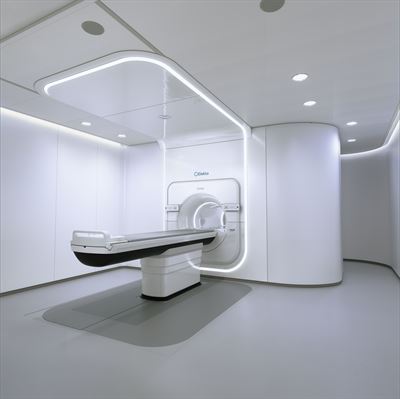Uppsala University Hospital first in Sweden to treat patient with Elekta Unity cancer treatment system

UPPSALA, Sweden, November 14, 2019 – Sweden’s first-ever patient to be treated on the groundbreaking Elekta Unity MR-Linac radiation therapy system took place at Uppsala University Hospital yesterday. Elekta Unity gives doctors the “vision” to zero in on tumors and avoid healthy tissues and thereby addresses an unmet need in cancer therapy – it enables clinicians to confidently see and track the target during treatment and respond accordingly, personalizing therapy for each patient every time they are treated. With Elekta Unity, radiation therapy can be more effective, which could mean not only fewer treatment-related side effects, but also the potential for fewer treatment sessions and visits to the hospital by the patient.
Zahra Taheri-Kadkhoda, Head of Radiation Treatment at Uppsala University Hospital, said: “An important advantage of radiation therapy guided by MR images is that the treatment becomes more individualized and can be targeted more precisely to the tumors. This can increase the chance of better tumor control and less risk of damage to surrounding healthy tissue, especially for tumor sites which are hard to visualize with non-MR techniques. The MR-Linac is also an inspiring project for broad and open collaborations between different medical disciplines and technical professionals with an ultimate goal to improve patient care.”
Elekta President and CEO, Richard Hausmann, said: “We are very excited that Uppsala University Hospital, as the first clinic in Sweden, has joined the growing number of cancer clinics around the world providing precision radiation medicine to their patients using the most advanced technology. Both Elekta and Uppsala University Hospital are renowned for their innovative approach to providing advanced cancer care. These synergies will benefit many of the more than 60,000 people diagnosed with cancer in Sweden each year.”
To date, there are 18 Elekta Unity systems in operation globally, of which eight are in Europe. The new technology integrates two critical but distinct technologies in a single platform: a state-of-the-art, high field MR imaging system, and a next-generation Elekta (EKTA-B.ST) linear accelerator. Tumors and surrounding organs can be located and their movement accurately tracked at the time of treatment. This allows treatment plans to be adapted while the patient is on the table in response to changes in tumor position, shape, biology and the relationship to sensitive organs over time.
Elekta Unity will be used to treat a wide range of cancers and may enable new therapeutic options for hard-to-treat cancers with anatomies that require crystal-clear imaging to effectively distinguish the tumor from nearby healthy tissues and organs-at-risk. This will allow anatomical structures that previously were determined unsuited for radiotherapy to be considered for treatment.
# # #
For further information, please contact:
Oskar Bosson, Global EVP Corporate Communications and Public Affairs
Tel: +46 70 410 7180, e-mail: Oskar.Bosson@elekta.com
Time zone: CET: Central European Time
Raven Canzeri, Global Public Relations Manager
Tel: +1 770 670 2524, e-mail: raven.canzeri@elekta.com
Time zone: ET: Eastern Time
About Elekta
For almost five decades, Elekta has been a leader in precision radiation medicine. Our nearly 4,000 employees worldwide are committed to ensuring everyone in the world with cancer has access to – and benefits from – more precise, personalized radiotherapy treatments. Headquartered in Stockholm, Sweden, Elekta is listed on NASDAQ Stockholm Exchange. Visit elekta.com or follow @Elekta on Twitter.
About Uppsala University Hospital
Uppsala University Hospital is one of Sweden´s largest hospitals, offering medical and nursing care of the highest standard. It is a source of both unique medical knowledge and the most advanced care available. Each year, more than 700,000 people are cared for. Uppsala University Hospital is a full-scale university hospital with 8,000 employees and 1,000 beds.


